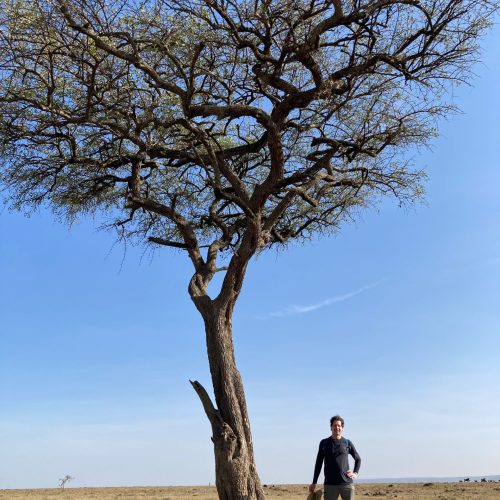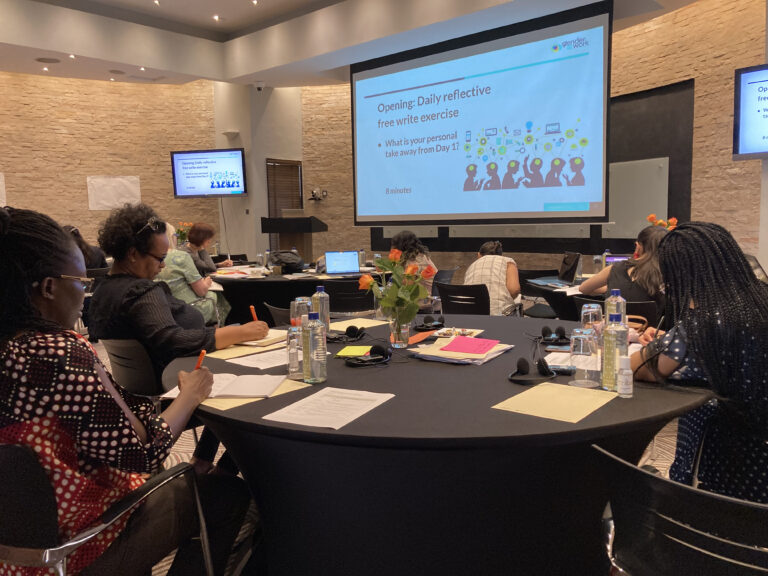This is the seventh blog post of the AI Research and COVID: Journeys to Gender Equality and Inclusion series. This blog series emerged from the “writeshop” organized by Gender at Work as part of the Data Science and Artificial Intelligence Research Program to Combat COVID-19, also known as AI4COVID, financed by the International Development Research Centre (IDRC) and Swedish International Development Agency (SIDA). The initiative was part of the final Gender Action Learning workshop held in Nairobi, Kenya in February 2023.
In this blog post, Ethan Gilsdorf reflects on the way he feels most engaged and enriched when visiting places that are least like his native land. He describes the disorientation and excitement experienced while traveling, and how initial differences observed with participants in the workshop and in Nairobi transformed into a sense of commonality through the sharing of stories on experiences of gender roles.
The displacement and disorientation of travel
I love to travel. Why am I most enriched when traveling to places the least like my native land?
When I’m furthest from my familiar surroundings, surrounded by difference, estranged from my own daily reference points, and when my perception of displacement is highest, I find myself the most engaged. I see myself more clearly. The more defamiliarization endured, and adjustment needed, the better.
The disorientation of travel begins with strange inoculations and unfair visa fees, then shifts to hours spent in airplanes and airports, time zone shifts and general fatigue.
The peculiarities of the place and surroundings wash over me. Why is this hot and sticky, or cold and damp climate so different from home? How do I convert this ‘foreign’ currency into my familiar one? What can I still say in the local language that I last studied back in 1984?
Riding in the courtesy van from the airport, I am confronted by other differences: olfactory differences, brand name differences, skin color differences, economic differences.
In these differences, I reach out for connection: I see a local walking a cow alongside the highway, dressed in a flowing robe and sandals. I imagine his life. Is he happy? Is he desperate? Has he felt love? Could we be friends? Passing through checkpoints and metal detectors, I arrive at a luxury hotel, curiously named “Tribe.” I take in the expanse of the lobby, bar, restaurant, gardens and pool. As a small town guy from a rural state, I don’t belong in this world either.
All of these features strike me as differences, both unsettling and thrilling.

‘Differences’ and ‘Sames’ in Nairobi
These were the foggy observations that clouded my mind when I arrived in Nairobi to help lead the AI4COVID Gender Action Learning Writeshop, where for a few days, I slipped into a bubble of life 180 degrees divergent from my life back home in the Northeastern United States.
The next morning, as I recovered from my hazy cloud of jet lag, the participants from Colombia, Ethiopia, South Africa, Malawi, Senegal, Mali, Kenya, Tanzania, Canada and the U.S. assembled for the first session. As we came together over coffee and biscuits, breakout groups and Post-It notes, I frantically downed seventeen cups of coffee, trying to match names to faces.
I felt that familiar rush of ‘first day of class’ anxiety—the sucker punches of disorientation and stress, then excitement and adrenaline. Based on my previous experience helping to lead writeshops for Gender at Work, I knew this sensation of displacement was part of the deal.
I was the hired gun, armed with pens and paper and PowerPoint presentations. I had nothing in common, at least superficially, with the group assembled in Nairobi. As a writer, teacher and artist, I’m about the furthest from a researcher or scientist or biostatistician as one can be. Numbers are my nemesis. I nearly failed high school chemistry and trigonometry. My new esteemed colleagues are passionate experts in healthcare, artificial intelligence and COVID research. Their world of data integration methodologies and predictive modeling is as foreign to me as Swahili. (That said, my nerdy obsessions with essay writing forms, Dungeons & Dragons, J.R.R. Tolkien and 1970s and 1980s pop culture would likely feel just as alien to them.)
Over our time together, with prompting and gentle prodding, I encouraged each participant to write some true story about their journeys through gender and intersectionality during their AI4COVID projects—as researchers, but also as humans. I tried to create a climate of trust among participants so they’d feel safe sharing them with each other. My role was, I suppose, to give permission—to say, ‘it’s OK to tell your story.’
Later, listening to the participants’ stories, I was surprised at how quickly our initial ‘differences’’ became ‘sames.’ And I found myself encouraged to share my own journey through gender roles, equality and inclusion.

I was raised by women: My experience of gender roles
My own journey to appreciate gender was the result of two key experiences: being raised by women, and being a caregiver to my mother at a young age.
I was parented, at first, by my mother and father. Then, after my parents’ divorce, my mom raised my siblings and me more or less single handedly. Mom was a full-time mother and school teacher, head of household and primary breadwinner, and did all the childrearing while also exploring her art—printmaking, photography and other projects. How she did all of this I’ll never know.
Growing up in the 1970s and 1980s, in a small town in New Hampshire about an hour from Boston, I was also surrounded by women who could do anything. My mother, my siblings and I were supported by a loose-knit, well-meaning and sometimes awkward network of ‘aunties’―sisters, friends, co-workers, neighbors—all feisty and outspoken and full of energy. They cooked, cleaned, raised children, worked outside the house, swung axes, drove trucks, started businesses, and debated politics. Many had been divorced from their husbands, sometimes by choice. (This was the 1970s, after all.)
After my mother suffered but survived a crippling brain aneurysm in 1978, the world shifted again. A family friend, also female, became my guardian, and cared for me, my siblings and my disabled mother.
In short, I was largely raised by women.
But after my mother’s stroke, I also found the roles reversed. I would give my mother a bath, help her get dressed and groomed, and handle caregiving chores and tasks around the house. Caring for your mother is not something most American teenage boys ever experience.
I did lose my mother to illness, and years later to death. That loss was painful, and caused me irreparable harm, but there was a small upside: I was transformed into a nurturer, listener and doer. I’m no brash, beer swilling American macho stereotype. I like to cook, garden and make art. As I water my bed of lettuce, take a ceramics class or concoct something in the kitchen, I am embodying my mother’s spirit.
I keep her, that woman in me, alive. Her gender difference is now, for me, a ‘same.’
Similar journeys and common themes
Now, reading these brave and honest stories of this AI4COVID blog series, I see how my own journey through gender is similar, but different, from what the participants shared in their stories. In these stories of being raised or coming of age or entering the workplace in Romania and Columbia, Tanzania and Senegal, I see common themes emerging. I see stories of gender roles expressed in many arenas. I see small-town life pitted against city values; modest means versus privilege; the world of men against the world of women; and tradition battling change. I see stories of dysfunctional families; discrimination in the workplace; experiences of misogyny and sexism; anti-gay rhetorical; and formative experiences as caregivers, as mentors, as students, as wives and brothers, sisters and husbands.
We can see ourselves in all of these stories. That is the reason for sharing our stories—to see ourselves reflected back in the experiences of others.
Now some weeks after the Writeshop, I’m home and surrounded by what’s familiar to me. Yes, I am yearning for my next trip. I’m craving my next ‘hit’ of displacement and disorientation. But I also know how I’ll see the world once I return: those ‘differences’ will, once again, be revealed to me as ‘sames.’
This blog post was written by Ethan Gilsdorf & is licensed under a CC BY 4.0 license. © 2023 Ethan Gilsdorf.
Ethan Gilsdorf is a memoirist, essayist, critic, journalist, poet, teacher, performer. He is the author of the award-winning memoir Fantasy Freaks and Gaming Geeks and published in the New York Times, Washington Post, Esquire, Wired, National Geographic, among others. He leads writing workshops at GrubStreet in Boston and for non-profit social justice organizations. You can find Ethan on Twitter.
Curious to read more reflections on AI, gender inequality and exclusions? Read the first blog posts from this series here: Amelia Taylor’s Can AI have its cake and eat it too?, Michelle Mbuthia’s Cook, Clean, Plan: A case for more gender-responsive policymaking, Meghan Malaatjie’s Are women programmed to think less and do more?, Jim Todd’s Break out of your silo, Mahlet Hailemariam’s Why are you talking to a blank screen?, and Sylvia Kiwuwa Muyingo’s A Biostatistician’s Personal Journey through Gender Bias.



